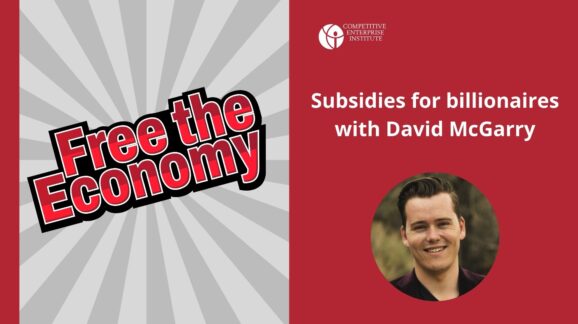There are two main areas in which Congress can enact meaningful reform. The first is to rein in regulatory guidance documents, which we refer to as “regulatory dark matter,” whereby agencies regulate through Federal Register notices, guidance documents, and other means outside standard rulemaking procedure. The second is to enact a series of reforms to increase agency transparency and accountability of all regulation and guidance. These include annual regulatory report cards for rulemaking agencies and regulatory cost estimates from the Office of Management and Budget for more than just a small subset of rules.
In 2019, President Trump signed two executive orders aimed at stopping the practice of agencies using guidance documents to effectively implement policy without going through the legally required notice and comment process.
Featured Posts

Blog
Free the Economy podcast: Subsidies for billionaires with David McGarry
In this week’s episode we cover White House intervention in corporate ownership, the nation’s falling economic freedom ranking, and welcome new…

News Release
Federal appeals court rules on NLRB unconstitutionality
The 5th Circuit Court of Appeals today issued a ruling suggesting the structure of the federal government’s top labor dispute regulator, the National Labor Relations…

Blog
The week in regulations: Import paperwork and postal possession
The 2025 Federal Register topped 40,000 pages. President Trump met with Vladimir Putin in Alaska. The Producer Price index rose at its fastest level since…
Search Posts
Blog
This Week in Ridiculous Regulations
Please do all you can to keep yourself and your loved ones safe. Hopefully Congress will also act on some of the #NeverNeeded regulations that…
Blog
California’s #NeverNeeded AB5 Is Harming the Coronavirus Response
California’s AB5 law was already backfiring before the COVID-19 pandemic hit. It has cost thousands of jobs—many of which are home-based. During a time of…
Blog
VIDEO: Road Map to Reopening
The U.S. Chamber of Commerce hosted a fascinating video conference this week entitled “Big Picture: Road Map to Reopening,” with the Chamber’s Suzanne Clark and…
Op-Eds
How The White House “Guidance For Regulation Of Artificial Intelligence” Invites Overregulation
Excessive top-down federal funding and governance of scientific and technology research will be increasingly incompatible with a future of lightly regulated science and…
Blog
How to Spot a #NeverNeeded Regulation
Not every regulation on the books is directly harming the COVID-19 response. There are a lot of other regulations that need reform, but the #NeverNeeded…
Inside Sources
Post-Virus Economics – Working Toward a Small Business Recovery
When the stay-at-home orders are lifted, we’ll be in a race to get millions of Americans back to work. Large companies will be in a…
Staff & Scholars

Clyde Wayne Crews
Fred L. Smith Fellow in Regulatory Studies
- Business and Government
- Consumer Freedom
- Deregulation

Ryan Young
Senior Economist
- Antitrust
- Business and Government
- Regulatory Reform

Fred L. Smith, Jr.
Founder; Chairman Emeritus
- Automobiles and Roads
- Aviation
- Business and Government

Sam Kazman
Counsel Emeritus
- Antitrust
- Automobiles and Roads
- Banking and Finance

Marlo Lewis, Jr.
Senior Fellow
- Climate
- Energy
- Energy and Environment